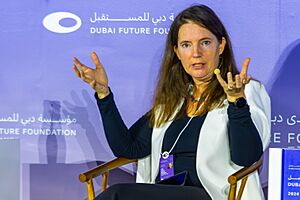Molly Stevens facts for kids
Quick facts for kids
Dame Molly Stevens
|
|
|---|---|

Stevens at the Dubai Future Forum (2024)
|
|
| Alma mater | University of Bath (BPharm) University of Nottingham (PhD) |
| Awards | Woolmer Lecture (2013) Kabiller Young Investigator Award (2019) FEBS/EMBO Women in Science Award (2021) |
| Scientific career | |
| Fields | Regenerative medicine Biosensing Tissue engineering |
| Institutions | University of Oxford |
| Thesis | Atomic force microscopy studies of biomolecular adhesion and mechanics (2000) |
Dame Molly Morag Stevens is a very important scientist. She is a professor at the University of Oxford. She studies bionanoscience, which is about tiny things in biology.
She also helps lead the Kavli Institute for Nanoscience Discovery. This institute explores very small materials. She is also part of the Department for Engineering Science.
Molly Stevens went to the University of Bath for her first degree. She earned a top grade in Pharmacy. Later, she got her PhD from the University of Nottingham. For her PhD, she used a special microscope called an atomic force microscopy. She used it to study how tiny biological parts stick together.
Contents
Molly Stevens's Career and Research
After finishing her PhD, Molly Stevens worked at the Massachusetts Institute of Technology. This is a famous science school in the United States. In 2004, she moved to Imperial College in London. Then, in 2023, she joined the University of Oxford.
The Stevens Group: Teamwork in Science
In 2004, Professor Stevens started her own research team. It is called The Stevens Group. This group is special because it brings together many different kinds of scientists.
Her team includes bioengineers, who design new medical tools. It also has materials scientists, who create new substances. Chemists, biologists, physicists, and even surgeons work together. They all work to solve big problems in medicine.
Awards and Special Recognitions
Professor Stevens has received many important awards for her work. These awards show how much her research helps people.
Awards in the 2010s
- 2010: She won an award from the International Union of Pure and Applied Chemistry (IUPAC). This was for her creative ideas in polymer science. Polymers are like plastics and other materials made of long chains. She also received the Rosenhain Medal. This medal is from the Institute of Materials, Minerals and Mining. The Royal Society of Chemistry gave her the Norman Heatley Award. This was for her work that combines different science areas.
- 2013: She gave the Woolmer Lecture for the Institute of Physics and Engineering in Medicine. She also won the Karen Burt Memorial Award. This award is given to the best new woman engineer or scientist in the UK.
Awards in the 2018s
- 2018: She became a trustee of the National Gallery in the United Kingdom. This means she helps guide the famous art museum. She also won the Rosalind Franklin Medal and Prize from the Institute of Physics.
- 2019: She was chosen as a foreign member of the National Academy of Engineering in the United States. She also received the Kabiller Young Investigator Award. This award is for young scientists doing great work in tiny science.
- 2020: She was elected a Fellow of the Royal Society (FRS). This is a very high honor for scientists in the UK.
Awards in the 2020s
- 2021: Professor Stevens received the FEBS/EMBO Women in Science Award. This award celebrates women who have made big impacts in science.
- 2023: She was given The Novo Nordisk Prize. This prize recognized her amazing work in bioengineering. Bioengineering uses engineering ideas to solve health problems.
- 2024: She was made a Dame Commander of the Order of the British Empire (DBE). This is a very special title given by the King. She received it for her important contributions to medicine.
 | Leon Lynch |
 | Milton P. Webster |
 | Ferdinand Smith |

